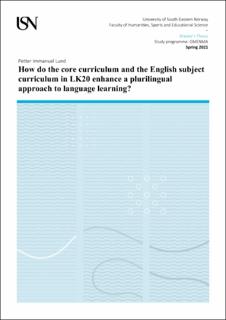| dc.contributor.advisor | Speitz, Heike | |
| dc.contributor.advisor | Weiss, Michael | |
| dc.contributor.author | Lund, Petter Immanuel | |
| dc.date.accessioned | 2022-01-13T17:41:25Z | |
| dc.date.available | 2022-01-13T17:41:25Z | |
| dc.date.issued | 2021 | |
| dc.identifier | no.usn:wiseflow:6306556:45361042 | |
| dc.identifier.uri | https://hdl.handle.net/11250/2837343 | |
| dc.description.abstract | The premise of this thesis is that the core curriculum and the English subject curriculum in Læreplanverket for Kunnskapsløftet 2020 (LK20) contain a form of plurilingualism (see this thesis ch. 1.1). This thesis is a document analysis of the core curriculum and the English subject curriculum in LK20 (see this thesis ch. 4). This thesis seeks to demonstrate that the core curriculum and the English subject curriculum (a.k.a. curriculum in English) in LK20 enhances a plurilingual approach to language learning by
* foregrounding plurilingualism in multilingualism (see this thesis ch. 5.2.1),
* softening the borders between languages (see this thesis ch. 5.2.2),
* using metacognition in language learning framed by plurilingualism (see this thesis ch. 5.2.3), and
* providing the opportunity to develop the identity of pupils through language learning (see this thesis ch. 5.2.4).
Since this thesis is a document analysis it is limited to the documents. How teachers will interpret these documents will be influenced by their beliefs about language learning. Hence it would be interesting to see further research into teachers’ beliefs about language learning as well as research into how plurilingual approaches to language learning manifest themselves inside and outside of the classroom. | |
| dc.description.abstract | | |
| dc.language | eng | |
| dc.publisher | University of South-Eastern Norway | |
| dc.title | How do the core curriculum and the English subject curriculum in LK20 enhance a plurilingual approach to language learning? | |
| dc.type | Master thesis | |
